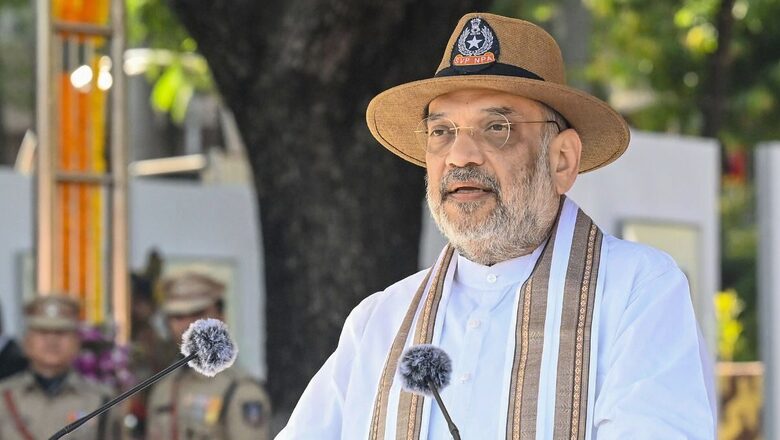
views
Amid the ongoing war of words between members of the opposition and the ruling party, the standing committee for home affairs on Friday decided to hold the next meeting on November 6 to discuss and adopt the draft report of the three bills referred to it by Union Home Minister Amit Shah-led Ministry in the last monsoon session of Parliament.
The Opposition MPs have requested the chair to seek an extension up to March 2024.
Shah had introduced three bills in the Lok Sabha to replace British-era criminal laws. The Bharatiya Nyaya Sanhita Bill 2023 will replace the Indian Penal Code, The Bharatiya Nagrik Suraksha Sanhita Bill, 2023, will replace The Code Of Criminal Procedure and The Bharatiya Sakshaya Bill, 2023, will replace The Indian Evidence Bill. These bills were referred to the standing committee for scrutiny.
Several leaders in the opposition, including former home minister and Congress leader P Chidambaram and Trinamool Congress (TMC) leader Derek O’Brien, had questioned the government on the tearing hurry to clear the bills. Chidambaram had also shared on social media his reservation of not having enough discussion on the bill, which is all set to overhaul crucial legislation in the country.
In its meeting on Friday, members sought more time to read the draft report after the Hindi version of the report was made available to the MPs on Thursday evening.
Several members, including Dravida Munnetra Kazhagam (DMK) MPs, have questioned the government as to why such a legislation is being cleared in such a hurry. The opposition MPs have alleged that this was being done by the Union government in a bid to get electoral gains. TMC MPs have been extremely vocal and also said that it was unfair to call for meetings in the middle of the festival season, especially in Bengal, where MPs would like to be in their constituencies.
O’Brien has often questioned the government’s intent both inside and outside Parliament, blaming the Modi government for what he called “bulldozing Parliament legislation without adequate scrutiny".
THE OBJECTIONS & EXPLANATIONS
Sources also indicate that in response to the allegations by the opposition bench, panel chief Brij Lal is said to have told the committee in detail about the consultation processes in the framing of this bill and how every stakeholder was taken into account. He also said that the Union government has reached out to every state and union territory, including the fact that the Home Minister held over 150 meetings on the bill, which also included meetings with political parties, chief justices, legal eagles, among others.
Members in the opposition, especially from the DMK, have been opposing the name given to the bill which is in Hindi. However, both the government as well as senior bureaucrats, who were present before the committee, have argued that it is not Hindi imposition. Just after the introduction of the bill when the objection was raised by the DMK, Shah had reacted and said that the new names of the bill are not Hindi, but Sanskrit.
After the Supreme Court struck down adultery, sources say that this bill again proposes to bring back adultery, which is going to be gender neutral, which is also being objected to by some MPs.
Some MPs have also questioned as to why despite having specific laws for terror cases, the government is trying to bring this under a common law like UAPA.
In some of the suggestions that MPs would want to be included in the bill, there have been talks about reducing the punishment for those caught in cases of agitation. As of now, the punishment includes imprisonment of up to two years. MPs argued that agitation is a process to express dissent in democracy and therefore the punishment in this case must not exceed more than one year.
Some MPs have also said that a very important consideration must be the cases that happened because of deaths caused by negligence. In such cases, including cases of road accidents caused by rash driving or even man-made calamity where people lose their lives, the punishment is only up to six months. MPs suggest that this punishment must be increased for up to two years to act as a strong deterrent for those who play with other people’s lives.
Several other suggestions have been given by various members, especially MPs who are from a legal background. The opposition camp has given about 10 to 15 suggestions, and sources indicate that of these, close to 10 suggestions have already been adopted in the draft report prepared by the panel.
Have been reading the drafts prepared by the Union Home Ministry to substitute the Indian Penal Code, Code of Criminal Procedure and Indian Evidence Act. Stunned to find that there is a serious attempt to quietly introduce very harsh and draconian anti-citizen provisions in these…— Mamata Banerjee (@MamataOfficial) October 11, 2023
AMENDMENTS OR NEW BILLS?
With more than 11 meetings to discuss threadbare legislations, the committee invited home secretary Ajay Bhalla, various officials of the Ministry of Home Affairs, former top cops, legal experts among others to depose before the panel in its process to prepare its report. It may be noted that the opposition party MPs had given a list of 17 prominent personalities, including former Chief Justice of India and lawyers to appear before the committee, of which allegedly only one lawyer was called to depose before the committee.
“Dand (punishment) was the basis on which the colonial laws were made. However, the intent of the Modi government to bring these Bills was very clear and that was for delivery of Nyay (Justice) and that too in a time-bound manner," a source says has been the explanation on the reason why these bills were being brought.
While sources indicated that MPs from the opposition camp would be submitting dissent notes, it is known that so far Congress leader (Lok Sabha) Adhir Ranjan Chowdhury, Rajya Sabha MP Digvijaya Singh and DMK Rajya Sabha MP NR Elango have submitted dissent notes opposing various clauses of the Bill.
There are several amendments that have been proposed to the bill. “Looking at the number of amendments, which also include putting a foolstop or even a comma, or changing a word or a couple of words in various clauses, may even prompt the Union government to come up with a fresh bill, replacing this one with all amendments in place. Passing an elaborate bill like this and passing the amendments proposed separately, if there are so many number, would be quite a headache and therefore it would be better to bring a new bill," a source told News18.
IPS probationers are getting an opportunity to lead in the new era of criminal justice system through three new criminal laws. It is your responsibility to implement these laws in letter and spirit at the grassroots level. pic.twitter.com/XkuRMP0idY— Amit Shah (@AmitShah) October 27, 2023
MINISTER SPEAKS
Shah, while addressing the Dikshant Parade of 75 RR batch of Indian Police Service (IPS) at Sardar Vallabhbhai Patel National Police Academy in Hyderabad on Friday, said that the government led by Prime Minister Shri Narendra Modi has made watershed changes in the three laws of the British rule – CrPC, IPC and Evidence Act and has placed three new criminal laws before the Parliament of the country.
He said, “Soon, all three new laws will be passed and on the basis of these laws our new criminal justice system will begin. After ending the era of laws made during the British period, India is entering a new era with new faith, hope and enthusiasm. The purpose of the old laws was to safeguard the government, but the purpose of the new laws is to safeguard the rights of the public and to eliminate obstacles in people’s access to those rights."
Shah said that with this fundamental change, the new officers and trainees are getting an opportunity to lead in this changing era of criminal justice system through these three laws.



















Comments
0 comment